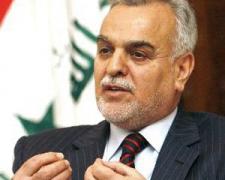The last convoy of U.S. soldiers pulled out of Iraq on Sunday, ending nearly nine years of war that cost almost 4,500 American and tens of thousands of Iraqi lives and left a country grappling with political uncertainty.They leave behind some 17.000 American personnel and some 200 troops attached to the American embassy in Baghdad.
The final column of around 100 mostly U.S. military MRAP armored vehicles carrying 500 U.S. troops
trundled across the southern Iraq desert from their last base through
the night and daybreak along an empty highway to the Kuwaiti border.
For President Barack Obama
the military pullout is the fulfillment of an election promise to bring
troops home from a conflict inherited from his predecessor, the most
unpopular war since Vietnam and one that tainted America's standing
worldwide. For Iraqis, though,
the U.S. departure brings a sense of sovereignty tempered by nagging
fears their country may slide once again into the kind of sectarian
violence that killed many thousands of people at its peak in 2006-2007.
Iraq's political uncertainty was underscored when late on Saturday an arrest warrant was issued against the Iraqi Vice
President Tariq al-Hashimi for being the mastermind behind
the recent bombing targeting the parliament.The car bombing which took place on November 28, was an attempt to assassinate one of the members of the parliament.  |
| Tareq al-Hashimi |
According to the Iraqi government, evidence pointed at al-Hashimi’s
embroilment after deriving confessions from four arrested Islamic Party members. An official from the interior
ministry announced earlier Saturday that they
will show confessions indicating the involvement of a higher rank
official in terrorist activities.
Hashimi was the head of the Islamic Party, a political party representative of the Muslim Brotherhood in Iraq, in 2004, but in 2009 he announced that he is no longer a member of the party. Instead, he created the Tajdeed movement, which is considered to be one of the political parties component of the secular Iraqiya block.
The allegations against Hashimi came hours after the Iraqiya bloc which won most of the votes of Iraq’s Sunni Arab minority, walked out of parliament. The bloc, led by former premier Iyad Allawi, said it was suspending its participation in parliamentary business in protest at what it charged was Prime Minister Nuri al-Maliki’s monopolization of all decision-making. “We can no longer remain silent about the way the state is being administered, as it is plunging the country into the unknown,” said the bloc, which holds 82 of the 325 seats in parliament, second only to Maliki’s National Alliance.
The bloc accused the Maliki government of “placing tanks and armored cars in front of the homes of Iraqiya leaders in the Green Zone,” the heavily fortified central Baghdad district that houses the official residences of leading politicians and government ministers as well as the British and U.S. embassies.
A spokesman from Iraqiya said that the allegations against Hashimi is an attempt by the Maliki to create a one-party system, thwart opposition and to gradually target and defile national Iraqi figures.
Hashimi was the head of the Islamic Party, a political party representative of the Muslim Brotherhood in Iraq, in 2004, but in 2009 he announced that he is no longer a member of the party. Instead, he created the Tajdeed movement, which is considered to be one of the political parties component of the secular Iraqiya block.
The allegations against Hashimi came hours after the Iraqiya bloc which won most of the votes of Iraq’s Sunni Arab minority, walked out of parliament. The bloc, led by former premier Iyad Allawi, said it was suspending its participation in parliamentary business in protest at what it charged was Prime Minister Nuri al-Maliki’s monopolization of all decision-making. “We can no longer remain silent about the way the state is being administered, as it is plunging the country into the unknown,” said the bloc, which holds 82 of the 325 seats in parliament, second only to Maliki’s National Alliance.
The bloc accused the Maliki government of “placing tanks and armored cars in front of the homes of Iraqiya leaders in the Green Zone,” the heavily fortified central Baghdad district that houses the official residences of leading politicians and government ministers as well as the British and U.S. embassies.
A spokesman from Iraqiya said that the allegations against Hashimi is an attempt by the Maliki to create a one-party system, thwart opposition and to gradually target and defile national Iraqi figures.





No comments:
Post a Comment